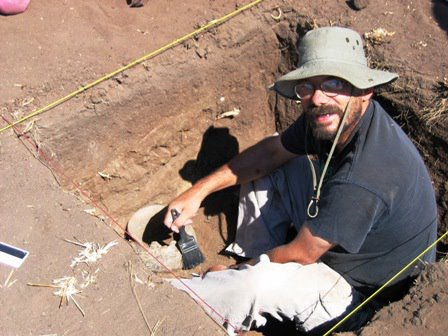I began teaching Intelligent Design in my Anthropology class tonight, in effect doing what the Discovery Institute (and President Bush) would like to see done in every science class. Now, before my colleagues in the science world have a hissy-fit, let me explain why. I’ve toyed with the idea of broaching the subject of ID for some time now, and while I have skirted the issue in class, I’ve never developed a lecture for it, largely because I fully agree that it is non-science. Unfortunately, ID has reached the point of a cultural phenomenon, and sometimes it is instructive to use such phenomena to make a point. I have already spent some time explaining the nature and brief history of science to the students, especially with regards to hypothesis testing, the concept of theory, and the circumstances under which one theory might be replaced by another. Teaching ID might reinforce good science for a number of reasons:
1) ID serves as a good foil to evolutionary theory. What better way to exemplify good science than by paring it off with nonsense masquerading as science? It’s a good way to highlight the differences and expound on why professional scientists don’t take it seriously. And not just “don’t”, but “can’t”. Put on an objective face, take ID at face value as its proponents suggest, and you still can’t do anything with it. It goes nowhere. Even trying to explain the components of ID tonight was quite difficult – there’s very little to grasp and the students are starting to understand this. As several science bloggers have noted, it’s a moving target;
2) Talking about ID is a good opportunity to answer its contrived “criticisms” of evolutionary theory. I think it serves us an opportunity to directly address the Cambrian Explosion, issues of transitional forms, the continued reducibility of “irreducible complexity” and the distinction between methodological and philosophical naturalism. “ID proponents claim THIS about the Cambrina Explosion…but here’s why such criticisms are at best misleading, and at worst completely fabricated…”;
3) I question the argument that most students will take away a message of ID being a legitimate science just because I talk about it in class. Some might…but I’d venture to guess that those who would draw that conclusion will not be swayed by any logical argument against ID in the first place. Most students will retain enough to know that ID has problems in the scientific world, and even if they haven’t encountered it yet, they are likely to at some point. If not the specifics, they’re likely to remember in broad concept that what the ID advocates are pushing in the media is either misleading or downright false. And the smaller proportion of students who really participate in class and take the learning very seriously will have a better understanding of how to counter ID arguments;
4) It provides an opportunity to point out that none of the “scientists” who advocate ID have ever produced a testable hypothesis or contributed to our knowledge about life's diversity and origins. Again, it will be easy to emphasize that there is nothing there to work with, even if you do accept it as a legitimate idea;
My approach to teaching ID is definitely NOT what Behe, Dembski or anyone at the Discovery Institute has in mind when they request that classes “teach the controversy”. I’m really curious as to how ID proponents will react. After all, I’m teaching ID….isn’t that what they’ve wanted all along?
Wednesday, February 22, 2006
Subscribe to:
Post Comments (Atom)




No comments:
Post a Comment